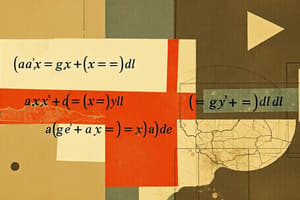Podcast
Questions and Answers
How do you solve the equation |x| = 7, and what are the final solutions?
How do you solve the equation |x| = 7, and what are the final solutions?
To solve |x| = 7, set up the equations x = 7 and x = -7. The final solutions are x = 7 and x = -7.
What is the solution set for the inequality |x| < 5, and how would you graph it?
What is the solution set for the inequality |x| < 5, and how would you graph it?
The solution set for |x| < 5 is -5 < x < 5. This would be represented on a number line with an open interval between -5 and 5.
Explain how you would approach solving the inequality |x| > 3.
Explain how you would approach solving the inequality |x| > 3.
For |x| > 3, set up the inequalities x < -3 or x > 3. This captures all values of x outside the interval (-3, 3).
If |x| = 0, what does this indicate about the value of x?
If |x| = 0, what does this indicate about the value of x?
How can graphical representation assist in solving absolute value inequalities?
How can graphical representation assist in solving absolute value inequalities?
Flashcards are hidden until you start studying
Study Notes
Solving Absolute Value Equations
- Definition: The absolute value of a number is its distance from zero on the number line, always non-negative.
- Standard Form: |x| = a, where a ≥ 0.
- General Solution:
- If |x| = a, then the solutions are:
- x = a
- x = -a
- If |x| = a, then the solutions are:
- Example:
- For |x| = 3:
- Solutions: x = 3 or x = -3
- For |x| = 3:
- Steps to Solve:
- Isolate the absolute value expression.
- Set up two separate equations (one for the positive case and one for the negative).
- Solve each equation individually.
- Check both solutions in the original equation.
Inequalities Involving Absolute Value
- Form: |x| < a or |x| > a, where a ≥ 0.
- For |x| < a (Within the bounds):
- The solution is: -a < x < a
- For |x| > a (Outside the bounds):
- The solution is: x < -a or x > a
- Example:
- |x| < 4:
- Solutions: -4 < x < 4
- |x| > 2:
- Solutions: x < -2 or x > 2
- |x| < 4:
- Steps to Solve Absolute Value Inequalities:
- Isolate the absolute value expression.
- Set up the appropriate compound inequality based on the inequality sign.
- Solve the resulting inequalities.
- Graph the solution on a number line to visualize.
Key Points to Remember
- When handling equations, always confirm solutions fit the original.
- For inequalities, consider both scenarios (less than and greater than) clearly and check for openings or closures on intervals.
- Graphical representation can aid in understanding the solution sets for inequalities.
Absolute Value Equations
- The absolute value of a number represents its distance from zero on the number line, always a non-negative value.
- The standard form for an absolute value equation is |x| = a, where 'a' is greater than or equal to zero.
- To solve an absolute value equation, we set up two separate equations: one for the positive value ('x' = 'a') and one for the negative value ('x' = - 'a').
- Always check if the solutions obtained satisfy the original equation.
Absolute Value Inequalities
- Absolute value inequalities follow the form |x| < a or |x| > a, with 'a' being greater than or equal to zero.
- When |x| < a, the solution lies within the bounds, represented as -a < x < a.
- When |x| > a, the solution falls outside the bounds, expressed as x < -a or x > a.
- To solve these inequalities, isolate the absolute value expression and set up the appropriate compound inequality (for less than or greater than).
- Visualizing the solution on a number line is helpful for understanding the intervals.
Key Points
- Always verify that the solutions found for equations satisfy the original absolute value equation.
- When solving inequalities, carefully consider both scenarios: less than and greater than.
- For inequalities, it's important to note whether intervals are open (exclusive) or closed (inclusive), denoted by parenthesis or brackets respectively.
- Visual representation through graphs can aid in understanding the solution sets for absolute value inequalities.
Studying That Suits You
Use AI to generate personalized quizzes and flashcards to suit your learning preferences.




